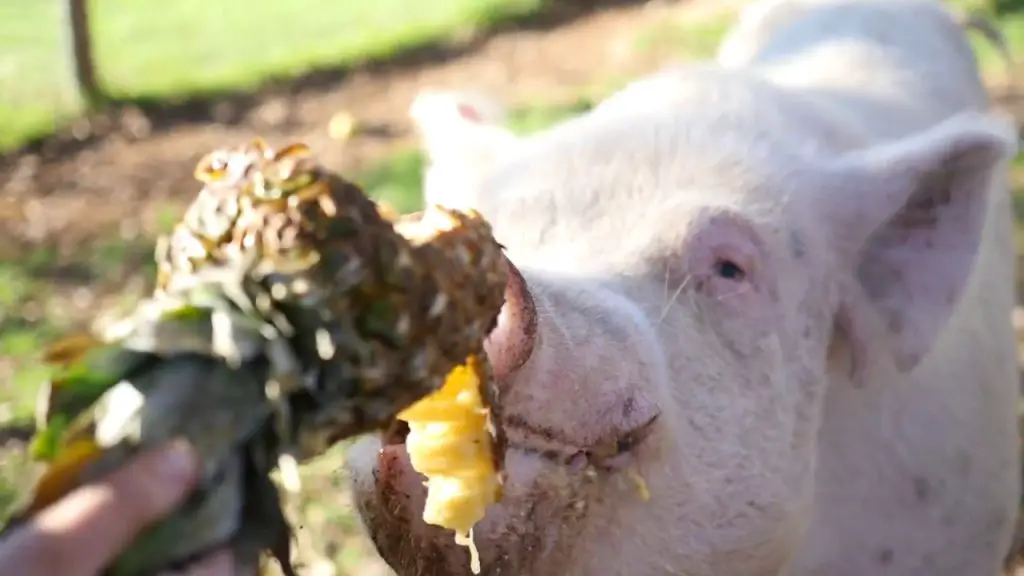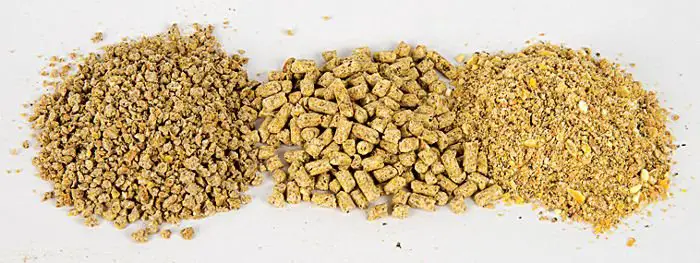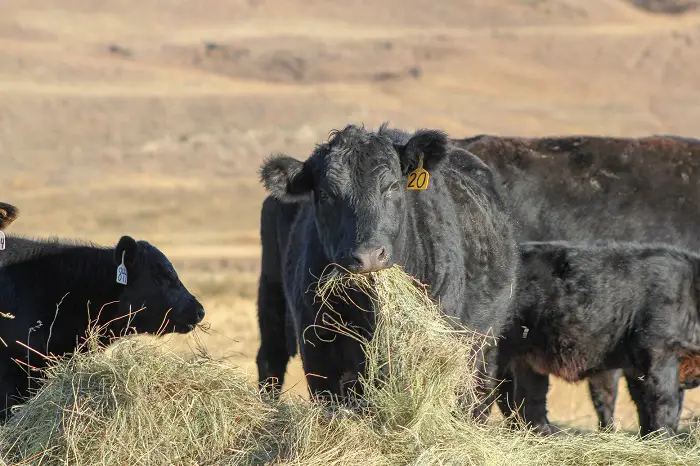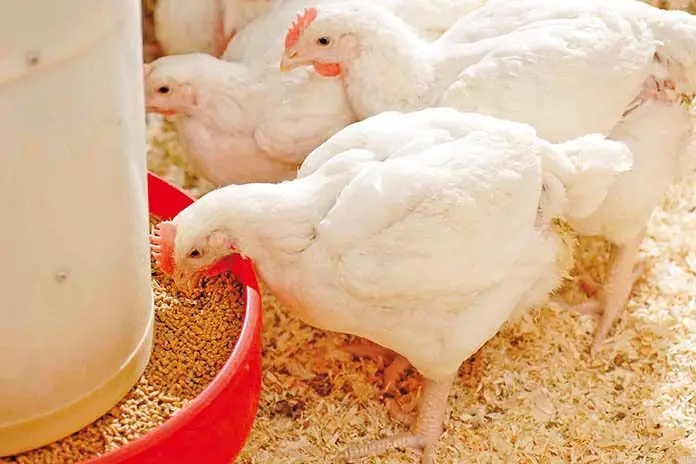Pineapples are a tropical plant with a sweet smelling and sweet edible fruit, indigenous to South America. Pineapples have always been regarded as an expensive fruit due to their difficulty to grow in cold or temperate climates. The plant is a small tough shrub with waxy leaves, and covered sharp spines, to avoid grazing by animals, the fruit is also covered by tough skin. This tough exterior makes the consumption of pineapples and their by-products limited in pigs, especially young pigs. Pigs have a limited ability to digest fiber being monogastric animals but are not fussy eaters and will eat almost anything offered to them.
Contents
Pigs as Monogastrics
The digestive system of the pig is very similar to that of human beings and will eat anything that humans can eat. In most systems, pigs are fed byproducts from human food processing or leftovers from human food. Because pigs have a simple stomach they cannot digest feeds with high fiber like ruminants which have a complex four-chamber stomach and a symbiotic relationship with fiber-digesting microorganisms. The main nutritional requirements for energy and protein in pig feed are mainly derived from cereal grain and oil seeds but many alternatives have been utilized over the years in a bid to utilize byproducts from different food processing systems to try and reduce the cost of pig production. This is where pineapples come into the feeding of pigs, where mostly the byproducts are utilized in supplementing pig feed.
Pigs Can Certainly Eat Pineapple
Pigs are intelligent, social animals that can make great pets, but they are also often misunderstood. People assume that they are dirty and smelly animals, but they are actually quite clean and have a good sense of smell. Pigs can even recognize their owners, and some have even been taught to do tricks. One thing that many people don’t know about pigs is that they can enjoy the sweetness of pineapple. Yes, you read that right – pigs can actually enjoy the taste of pineapple.
Pineapples Global Distribution
Commercial pineapple production is mostly confined to the tropics as the plants do not do well in cold climates. In Europe, they are mostly grown in greenhouses which makes the quite expensive to produce and not really conducive for feeding to pigs unless it is rejected fruit fed as snacks for pigs. In the tropics where supply is ubiquitous pineapples, and their byproducts are used as pig feed, most research was conducted in Hawaii.
Nutritional Profile of Pineapples
Pigs can utilize various parts of the pineapple except for the leaves which are very tough and fibrous, below we will look at only the parts of the plant and any byproducts that can be fed to pigs. The whole pineapple is packed with nutrients that are good for pigs from carbohydrates, sugars, vitamins, and minerals. The high soluble sugar content makes pineapples very rich in energy almost comparable to cereal grains. Pineapples have a very low protein content and high fiber these are the major limiting factors to feeding pineapples to pigs. For pig feeding mostly the byproducts are used especially those generated during the canning process comprised mostly of skins and cores. Whole pineapples can be fed where rejects or spoiled fruits are available. This fact applies to most fruits that pigs are fed on and in some cases, pigs are allowed to roam free in orchards picking up fallen fruits like apples.
Table 1: Typical Nutrient Composition Pineapple Canning Byproduct
| Analysis | Unit | Composition |
| Dry Matter | % as fed | 88.6 |
| Crude Protein | %DM | 4.5 |
| Crude Fiber | %DM | 17.8 |
| Calcium | g/kg DM | 4.9 |
| Phosphorus | g/kg DM | 1.3 |
| Gross Energy | MJ/kg DM | 17.0 |
| Energy digestibility Pigs | % | 62.2 |
| DE Growing Pig | MJ/kg DM | 10.6 |
The above are average figures and it is advised to test all batches of byproducts for nutrition and probable antinutritional factors before feeding to pigs.
What are the nutritional benefits of pineapple?
Pineapple is a nutritious fruit packed with vitamins and minerals. It is an excellent source of vitamin C, which can help to boost the immune system and protect against free radical damage. It is also a good source of vitamin B6, as well as other B vitamins, which are important for energy production and healthy metabolism.
- Pineapple is also a good source of dietary fiber, which can help to regulate digestion and keep your pig’s digestive system healthy.
- Pineapple is also a good source of minerals such as potassium, magnesium, and iron. These minerals are important for cell growth, energy production, and muscle contraction.
- Additionally, pineapple contains other phytochemicals such as bromelain, which can help to reduce inflammation and improve digestion.
Pineapple By-Products for Pig Feeding
Two byproducts have been tried and used successfully in the feeding of pigs namely the canning byproducts and juice from pineapple processing. Both feeds are high in soluble sugars and very low in protein. Pineapple juice has been used to replace half of the grain in pig diets of adult pigs with satisfactory results. Canning byproducts are very variable in nutrient content depending on the amounts of skin and core in the final product. This variability makes it difficult to calculate feeding allowances that guarantee good results but as a rule of thumb not more than 5% of byproducts should be included. Feeding pineapples and their byproducts is still only recommended for growing and adult pigs, young pigs have a limited ability to digest high-sugar and fiber diets.
How to feed Pineapples to Pigs
Although pigs have a full complement of teeth with incisors, canines, premolars, and molars for chewing, pineapple still poses a challenge in terms of consumption by pigs. This is due to the high fiber content of the fruit and to ensure good feed intake the pineapple should be chopped or ground up before feeding to the pigs. Juice can be added to grain meals like molasses to boost the energy content of the final feed. Pineapple leaves should not be fed to pigs as they are too coarse for them to chew and digest. Pineapple cores should also be avoided for young pigs as they might not be able to chew and digest them well. An important thing to note is that pineapple cannot be the core diet of the pig but should be incorporated with other feeds. Feeding as an occasional snack poses no challenges as pigs will readily eat pineapples.
Constraints of Feeding Pineapples to pigs
Pineapples although readily available in most countries are mostly grown in tropical countries this means that in most countries it’s an absolute luxury to feed pineapples to pigs. Pineapples as mentioned have a high fiber content which restricts their intake by pigs as they have a limited ability to digest fiber. With commercial production and the wide use of pesticides, you should also be careful to wash pineapples well before feeding them to pigs.
Is Pineapple Safe For Pigs To Eat?
Pineapple is generally safe for pigs to eat, but it should be given in moderation. Pigs have sensitive digestive systems, and too much pineapple can cause an upset stomach.
- Pineapple should also not be given to pigs that are pregnant or nursing, as it can cause diarrhea or other digestive problems.
- Additionally, pineapple should not be given to pigs that are overweight, as it can cause weight gain. Pineapple skin and core should also not be given to pigs, as these can cause choking or blockages in the digestive system.
- The fruit should be peeled and the core removed before giving it to the pig. When feeding pineapple to pigs, it is important to make sure the fruit is ripe, as unripe pineapple can cause digestive problems.
What Are The Health Benefits Of Eating Pineapple For Pigs?
- Pineapple is a nutritious fruit that can provide a number of health benefits for pigs.
- The vitamins and minerals in pineapple can help to boost the immune system and protect against free radical damage.
- The dietary fiber in pineapple can also help to regulate digestion and keep the pig’s digestive system healthy.
- Additionally, the bromelain in pineapple can help to reduce inflammation and improve digestion. Eating pineapple can also help to keep your pig’s teeth and gums healthy. The rough texture of the fruit can help to remove plaque and tartar buildup, which can lead to gum disease. Additionally, the high vitamin C content of pineapple can help to promote healthy teeth and gums.
Can Pigs Really Enjoy The Sweetness Of Pineapple?
Yes, pigs can definitely enjoy the sweetness of pineapple. They have a great sense of taste, and they will often devour ripe pineapple with enthusiasm. If you’re looking for a special treat for your pig, pineapple is a great choice! For the best results, it’s important to feed your pig ripe pineapple. Sweet, ripe pineapple will be more appealing to your pig and easier to digest. You should also avoid giving your pig too much pineapple, as it can cause digestive upset.
Do Pigs Need To Eat Pineapple As Part Of Their Diet?
No, pigs do not need to eat pineapple as part of their diet. While pineapple is a nutritious fruit that can provide a number of health benefits, it should not be the only food that your pig eats. Pigs need a balanced diet that includes a nvariety of fruits and vegetables, as well as hay, pellets, and other types of foods. Pineapple can be a great treat for your pig, but it should not be their primary source of nutrition. If you want to give your pig pineapple, it’s important to feed it in small amounts and make sure it is ripe.
Conclusion
Pigs can eat pineapples without any detrimental effects on their health or productivity, however, pineapples should be fed to pigs in moderation. The high sugar content also makes them less ideal for daily feeding. In most cases, the pigs will restrict their intake of pineapples due to the high fiber content, this is despite the fact that pineapples are rich in energy and vitamins. Pineapples and their byproducts, where available, fed as part of a balanced diet are a good addition to a pig diet that can reduce the production cost by reducing the feed cost




